Yiyang Feng
Tracking the Limits of Knowledge Propagation: How LLMs Fail at Multi-Step Reasoning with Conflicting Knowledge
Jan 21, 2026Abstract:A common solution for mitigating outdated or incorrect information in Large Language Models (LLMs) is to provide updated facts in-context or through knowledge editing. However, these methods introduce knowledge conflicts when the knowledge update fails to overwrite the model's parametric knowledge, which propagate to faulty reasoning. Current benchmarks for this problem, however, largely focus only on single knowledge updates and fact recall without evaluating how these updates affect downstream reasoning. In this work, we introduce TRACK (Testing Reasoning Amid Conflicting Knowledge), a new benchmark for studying how LLMs propagate new knowledge through multi-step reasoning when it conflicts with the model's initial parametric knowledge. Spanning three reasoning-intensive scenarios (WIKI, CODE, and MATH), TRACK introduces multiple, realistic conflicts to mirror real-world complexity. Our results on TRACK reveal that providing updated facts to models for reasoning can worsen performance compared to providing no updated facts to a model, and that this performance degradation exacerbates as more updated facts are provided. We show this failure stems from both inability to faithfully integrate updated facts, but also flawed reasoning even when knowledge is integrated. TRACK provides a rigorous new benchmark to measure and guide future progress on propagating conflicting knowledge in multi-step reasoning.
Unraveling Misinformation Propagation in LLM Reasoning
May 24, 2025



Abstract:Large Language Models (LLMs) have demonstrated impressive capabilities in reasoning, positioning them as promising tools for supporting human problem-solving. However, what happens when their performance is affected by misinformation, i.e., incorrect inputs introduced by users due to oversights or gaps in knowledge? Such misinformation is prevalent in real-world interactions with LLMs, yet how it propagates within LLMs' reasoning process remains underexplored. Focusing on mathematical reasoning, we present a comprehensive analysis of how misinformation affects intermediate reasoning steps and final answers. We also examine how effectively LLMs can correct misinformation when explicitly instructed to do so. Even with explicit instructions, LLMs succeed less than half the time in rectifying misinformation, despite possessing correct internal knowledge, leading to significant accuracy drops (10.02% - 72.20%). Further analysis shows that applying factual corrections early in the reasoning process most effectively reduces misinformation propagation, and fine-tuning on synthesized data with early-stage corrections significantly improves reasoning factuality. Our work offers a practical approach to mitigating misinformation propagation.
Nuance Matters: Probing Epistemic Consistency in Causal Reasoning
Aug 27, 2024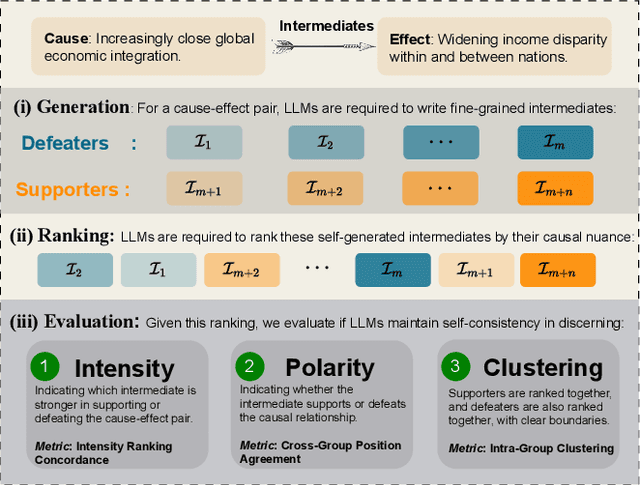
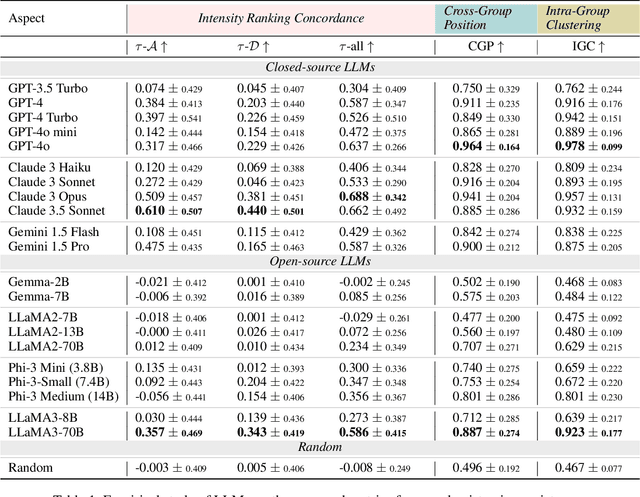
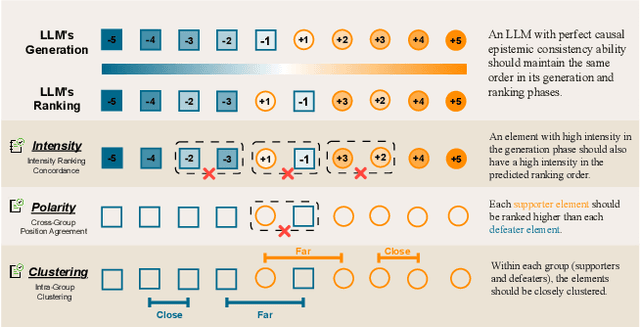
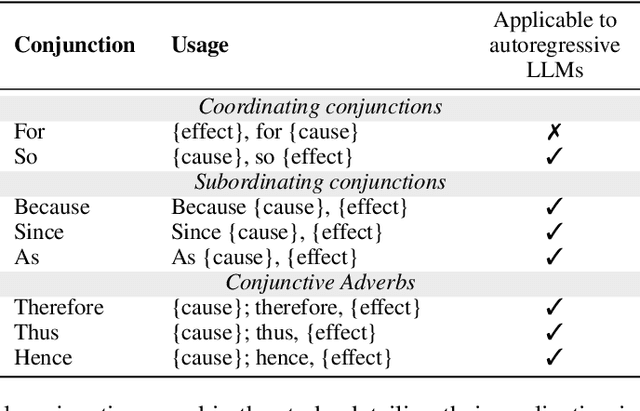
Abstract:To address this gap, our study introduces the concept of causal epistemic consistency, which focuses on the self-consistency of Large Language Models (LLMs) in differentiating intermediates with nuanced differences in causal reasoning. We propose a suite of novel metrics -- intensity ranking concordance, cross-group position agreement, and intra-group clustering -- to evaluate LLMs on this front. Through extensive empirical studies on 21 high-profile LLMs, including GPT-4, Claude3, and LLaMA3-70B, we have favoring evidence that current models struggle to maintain epistemic consistency in identifying the polarity and intensity of intermediates in causal reasoning. Additionally, we explore the potential of using internal token probabilities as an auxiliary tool to maintain causal epistemic consistency. In summary, our study bridges a critical gap in AI research by investigating the self-consistency over fine-grained intermediates involved in causal reasoning.
δ-CAUSAL: Exploring Defeasibility in Causal Reasoning
Jan 06, 2024

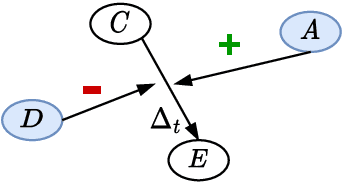

Abstract:Defeasibility in causal reasoning implies that the causal relationship between cause and effect can be strengthened or weakened. Namely, the causal strength between cause and effect should increase or decrease with the incorporation of strengthening arguments (supporters) or weakening arguments (defeaters), respectively. However, existing works ignore defeasibility in causal reasoning and fail to evaluate existing causal strength metrics in defeasible settings. In this work, we present {\delta}-CAUSAL, the first benchmark dataset for studying defeasibility in causal reasoning. {\delta}-CAUSAL includes around 11K events spanning ten domains, featuring defeasible causality pairs, i.e., cause-effect pairs accompanied by supporters and defeaters. We further show current causal strength metrics fail to reflect the change of causal strength with the incorporation of supporters or defeaters in {\delta}-CAUSAL. To this end, we propose CESAR (Causal Embedding aSsociation with Attention Rating), a metric that measures causal strength based on token-level causal relationships. CESAR achieves a significant 69.7% relative improvement over existing metrics, increasing from 47.2% to 80.1% in capturing the causal strength change brought by supporters and defeaters. We further demonstrate even Large Language Models (LLMs) like GPT-3.5 still lag 4.5 and 10.7 points behind humans in generating supporters and defeaters, emphasizing the challenge posed by {\delta}-CAUSAL.
 Add to Chrome
Add to Chrome Add to Firefox
Add to Firefox Add to Edge
Add to Edge